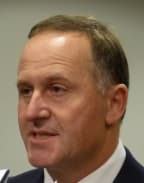The Government is being warned that any planned extension to its spy agency's powers could mean New Zealanders' information will end up being misused in the hands of overseas intelligence agencies.
The warning comes after revelations about the Prism programme in the United States. Former CIA technical worker Edward Snowden has revealed that the National Security Agency uses the clandestine surveillance programme to monitor computer and telephone networks worldwide.
Legislation is being rushed through Parliament to allow the Government Communications Security Bureau (GCSB) to legally spy on New Zealanders.
Peter Gutmann, a computer security expert at Auckland University, said on Tuesday that data could be sent overseas under one of New Zealand's information-sharing agreements.
Dr Gutmann says when it does go offshore, New Zealanders will have no control over what happens to their information.
Rick Shera, a lawyer specialising in internet law, said any plans by the Government to speed up legislation should be pushed back, given what has been learnt about Prism.
Mr Shera said expansion of powers and intrusion into people's privacy could have serious and unforeseen consequences. He said reports say some members of the US Congress were completely unaware how millions of people would be monitored when they passed legislation.
Public submissions on the amended bill close on Thursday.
PM pressed
Prime Minister John Key was questioned in Parliament on Tuesday over whether or not foreign spy agencies have been collecting information about New Zealanders.

John Key. Photo: RNZ
Labour Party leader David Shearer asked Mr Key if these agencies were routinely gathering emails, other communications or location data. Mr Key replied that they were not.
Mr Shearer then asked whether New Zealand's spy networks use or have access to the Prism system. Mr Key replied that it is not in the public interest to go into the operational programmes used by spy agencies.
However, the Prime Minister told the House he has sought an assurance from the GCSB that it is acting in accordance with New Zealand law and said it does not ask agencies in other countries to circumvent that law.
Meanwhile, the Privacy Commission is working with overseas agencies to see what impact, if any, the Prism programme has had on New Zealanders.
Privacy Commissioner Marie Shroff said the extent of the surveillance is concerning, but it is still not clear how it might affect New Zealanders. Ms Shroff said the commission does not have specific jurisdiction to monitor the GCSB and what role, if any, it plays in the Prism activity.
Hager praises leaker
New Zealand author Nicky Hager praised Edward Snowden for leaking details of Prism, saying he is a brave man.
Mr Snowden, a defence contractor for the Defence Security Agency, voluntarily revealed his identity on Sunday after leaking information to The Guardian. The 29-year-old is in Hong Kong where he has gone into hiding after checking out of his hotel.
Mr Hager, who has written about spying by the GCSB told Radio New Zealand's Morning Report programme that tens of thousand of staff work with sensitive information, but very few speak out and Mr Snowden will be remembered for a long time.
Mr Hager said Mr Snowden is already on the same scale of bravery as Daniel Elsberg, who released the Pentagon Papers to The New York Times and The Washington Post in 1971, and Private Bradley Manning who leaked information to WikiLeaks.
He said Mr Snowden must have felt the National Security Agency was intruding on a massive scale and had to be exposed.

